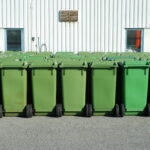A BioCycle article demonstrates the progress Massachusetts has accomplished in eliminating food waste and the continuing challenges and opportunities for growth. The article was written by John Fischer, Branch Chief for Commercial Waste Reduction at the Massachusetts Department of Environmental Protection and Elizabeth Johnston who is a Senior Manager at ICF’s Cambridge office.
Massachusetts has taken significant strides in cutting the amount of food waste that is thrown away. A combination of policy, infrastructure development, technical assistance, and education have led to the state advancing toward its target to divert 350,000 tons of organic materials from the waste stream each year.
The implementation of the Commercial Organics Waste Ban in 2014 was an important step to catalyze the state’s infrastructure for taking food waste. After two years of the ban being in effect, there were indications that the ban and supporting programs such as RecyclingWorks, which is a program funded by the MassDEP, were succeeding in promoting the growth of food waste diversion; however, there was no statewide quantification of that growth. MassDEP contracted with ICF to analyze the trends of the nascent organics industry and ICF reported that tonnage, employment, and other economic indicators were all trending upward as a result of the ban and supporting programs.
According to ICF’s report, the amount of organic material handled by haulers and processors was six to eight times greater in 2015 compared to 2010. As of 2016, the burgeoning industry also supported more than 900 jobs and produced approximately $175 million in economic activity. See the full report for more data on the economic and environmental impacts of the organics ban.
While the Commonwealth has been successful in reducing the amount of organic waste going to landfills, there is more opportunity to expand. According to the authors, addressing key barriers such as finding space for composting facilities, preventing contamination, and more stringent enforcement of the organics ban will produce even more positive outcomes.
There is also ample opportunity to bolster food rescue initiatives to prioritize feeding hungry people over feeding compost piles. Our Food Donation Guidance page provides resources for donating surplus food including a list of food rescue organizations that serve Massachusetts.
RecyclingWorks in Massachusetts assists businesses and institutions with recycling and food waste reduction through food donation and composting. To speak to a recycling expert, call our hotline: (888) 254-5525 or email us at info@recyclingworksma.com.

